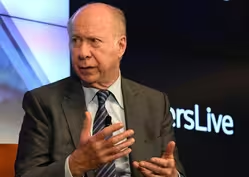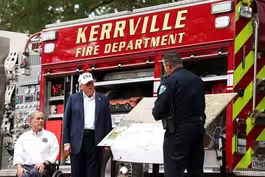
Brooks and Capehart on federal response to Texas floods
Clip: 7/11/2025 | 11m 24sVideo has Closed Captions
Brooks and Capehart on the federal response to the Texas flooding disaster
New York Times columnist David Brooks and Washington Post associate editor Jonathan Capehart join Amna Nawaz to discuss the week in politics, including the federal response to the flooding disaster in Texas, another round of tariff threats from President Trump and reflections on the life and career of David Gergen.
Problems playing video? | Closed Captioning Feedback
Problems playing video? | Closed Captioning Feedback
Major corporate funding for the PBS News Hour is provided by BDO, BNSF, Consumer Cellular, American Cruise Lines, and Raymond James. Funding for the PBS NewsHour Weekend is provided by...

Brooks and Capehart on federal response to Texas floods
Clip: 7/11/2025 | 11m 24sVideo has Closed Captions
New York Times columnist David Brooks and Washington Post associate editor Jonathan Capehart join Amna Nawaz to discuss the week in politics, including the federal response to the flooding disaster in Texas, another round of tariff threats from President Trump and reflections on the life and career of David Gergen.
Problems playing video? | Closed Captioning Feedback
How to Watch PBS News Hour
PBS News Hour is available to stream on pbs.org and the free PBS App, available on iPhone, Apple TV, Android TV, Android smartphones, Amazon Fire TV, Amazon Fire Tablet, Roku, Samsung Smart TV, and Vizio.
Providing Support for PBS.org
Learn Moreabout PBS online sponsorshipAMNA NAWAZ: And we turn now to the analysis of Brooks and Capehart.
That is New York Times columnist David Brooks, and Jonathan Capehart, associate editor of The Washington Post.
Good to see you both.
JONATHAN CAPEHART: Hey, Amna.
AMNA NAWAZ: I want to ask both of you to reflect on the legacy that David Gergen leaves behind in just a moment.
But, first, I want to begin, just as he did so many Fridays, with the news of the week.
And let's start with those Texas floods, David, the devastating loss so many there have felt.
And we saw President Trump, first lady Melania Trump on the ground in the Texas Hill Country.
You have covered a lot of presidents visiting a lot of disasters and tragedy sites.
What stood out to you from this visit?
DAVID BROOKS: Yes, I mean, Donald Trump doesn't do empathy tremendously well, but I thought he was OK. And he's being blamed.
And I think the strongest critique made of the administration is that DOGE and some of the some of the cuts in the National Weather Service and FEMA left them without key personnel.
And that may have had an impact.
It's really hard to know.
But it's always worth remembering that FEMA sent down roughly a little over 100 people, which is about what they sent to North Carolina under Biden.
But the state of Texas had 1,700 people.
So it's worth reminding ourselves this is primarily a state job.
And the state authorities are well thought of and well regarded.
So for the horrible tragedy that happened there, and I spent a lot of time in Kerrville, those canyons are -- there's no place to go when the water's there.
And I think it's -- people are overpoliticizing the reaction.
I'm not sure it could have been that much better in the last couple of days.
AMNA NAWAZ: Jonathan, what do you take away from the visit?
JONATHAN CAPEHART: It is always great when the president of the United States goes to an area where people are grieving, where people -- excuse me -- where people are suffering.
And so I give the president credit for going.
However, it is a little hard to hear the president say when asked about a report, FEMA decision-making was delayed because of a decision -- excuse me -- decision made by the secretary, and he says, I don't know anything about that.
That's not acceptable.
The president of the United States should, at a minimum say, we will get to the bottom of that, but right now we are here and we're going to be there for the people of Texas.
I think when we see natural disasters, as much as people criticize FEMA and have maybe legitimate questions about FEMA, it just goes to show the importance and the need for a federal response on top of the state and local response.
When you see a natural disaster like that, the state can't do it alone, and it shouldn't.
AMNA NAWAZ: We have seen, of course, a lot of uncertainty, questions ahead on both of those fronts.
We will continue to follow in Texas.
Meanwhile, on the economic front, still a lot of uncertainty questions around the president's tariffs policies, especially this week.
Just late last night, we saw the president threaten higher tariffs on Canada.
That is despite the fact that there were relatively decent talks going on, by all accounts, positive atmosphere between Prime Minister Carney and President Trump.
We know Carney is often called the Trump whisperer, David.
But we now have a new threat against Canada, the letter sent by the president to 22 nations threatening higher tariffs,the deadline to reach a deal pushed to August 1.
Is this just chaos?
Is there a strategy here?
Or is it just figuring it out as we go?
DAVID BROOKS: There's a strategy every five minutes.
I'm not sure the strategy lasts more than five minutes.
And that's been the nature of Trump and the lack of a policy process.
The thing I'm thinking about is, will this lead to inflation?
And as the CEO of the toy company Basic Fun!, which I was not familiar with -- Tonka, I know -- made clear, this can be spread over -- the retailers on this side, the shippers, the manufacturers.
There are a lot of people who can eat some of the cost.
And so far, we have not seen price rises.
But it's early days yet.
Our latest public inflation numbers are for May.
That's not up to current.
So it could be catching up.
Second, I think a lot of the reason a lot of companies are not passing the cost on to consumers is because they think they're going to come down, that Trump's going to change his mind again.
AMNA NAWAZ: Yes.
DAVID BROOKS: And so why should they burn their relationship with the consumer if Trump's going to pull the tariffs back?
If it becomes clear over the next three, four months that he's not going to pull back, then I think consumers are really going to start seeing high prices.
And that's going to be on toys.
That's going to be on things like car seats.
I have learned a lot about car seats in the last month.
They're way more expensive than they I thought they were, at least when my kids were little.
But -- so then, if you start paying $400, $500 for a car seat, then you notice.
AMNA NAWAZ: Yes.
DAVID BROOKS: And then the effect on our politics will be significant.
AMNA NAWAZ: Jonathan, you see it that way?
We have yet to see the real impact?
JONATHAN CAPEHART: Well, sure, although I'm going to ask you later, why are you looking at car seats, David?
DAVID BROOKS: For this story.
(LAUGHTER) JONATHAN CAPEHART: OK. We will talk.
(LAUGHTER) JONATHAN CAPEHART: I don't understand what the president's doing here with -- he's taken his 20th century view of tariffs from the 1980s, trying to apply it to a 21st century world.
No one knows what any of this means.
And David's talking about inflation, higher prices.
We just don't know.
Economists say that the American people are going to get hammered, that the president telling everyone that we're getting screwed by these other nations and that they're going to pay the tariffs, that just isn't true.
And so the thing I keep coming back to on a whole lot of things that the president does, I'm asking the question, why are we not talking about his mental acuity in the way we would if President Biden had been saying and doing a lot of these erratic things?
And we're not.
And I think we need to start having that conversation.
Why is he going down this road on tariffs?
You might ask me about Brazil.
I'm going to just jump in and talk about this.
AMNA NAWAZ: Please do.
JONATHAN CAPEHART: So what he's doing with Brazil has nothing to do with economic policy and everything to do with retribution against trying to go after the judge in the case involving the former president.
AMNA NAWAZ: That's right, who's an ally of his, we should point out.
JONATHAN CAPEHART: And who's an -- right, who is an ally of his.
That should not be the basis of American foreign policy or American economic policy.
And yet here we are.
AMNA NAWAZ: Well, David, what about that, this idea that tariffs are being used as a political cudgel here, right?
Just to catch people up, he's threatening higher tariffs against Brazil if the case against the former President Jair Bolsonaro is not dropped.
Bolsonaro and Trump are very closely aligned in their ideological views and political views.
What do you make of that?
DAVID BROOKS: Yes, he's about power, power for the sake of power.
And tariffs are a form of power.
You can squeeze other countries and try to get what you want.
I think it tends to be counterproductive, because other countries, as the Brazilians said, we're going to stand up to you.
We're not going to cower before you.
And you're basically threatening them.
And if you don't do what we say, we're going to shoot ourselves in the foot.
Like, it's imposing costs on ourselves.
And so I don't think it's particularly effective.
I will say, for the acuity, when Donald Trump was young and probably sharper than he was now, one thing he actually believed in, in the 1980s was tariffs.
And so this is a lifelong obsession with this guy.
AMNA NAWAZ: There's consistency, at least.
I do want to ask you both briefly as well about the mass firings at the State Department we reported on earlier.
That follows a Supreme Court ruling that basically cleared the way for the Trump administration to move forward with those reductions in force.
What's going to be the impact here, David?
DAVID BROOKS: Yes, I was once having lunch with a buddy of mine in the State Department.
And he was a political appointee.
And he said: "I thought this was about foreign affairs, but this institution is really about foreign relations."
And what he meant by that, it's not about policy.
It's about building relationships with people in other governments.
And that really is -- to get something done, it's not enough -- you have to be able to call them on the phone.
You have to have a history of trust.
And so our diplomats out there have been doing this for decades.
And they have built relationships with their counterparts around the world, with other people.
And if you take away that relational element, anybody in any business understands this, you have taken away a lot.
And so we have not seen a rapid increase in federal employees.
It's been pretty stable for a long time.
And so I doubt there's much waste and abuse in the State Department.
But we're suffering with those loss of those relationships.
JONATHAN CAPEHART: It's shameful what happened today at the State Department.
In addition to what David is saying, what we have lost today is decades, generations worth of relationships, expertise, knowledge, just the basis of American foreign policy.
To David's point, a lot of the policies pursued by the United States wasn't just because Congress and the president worked and hammered out a deal or a treaty or whatever.
It's the people on the ground.
And we have lost that.
We spent generations building it, decades building it, and gone in an afternoon.
AMNA NAWAZ: Before we go, I want to let each of you say whatever you would like to share.
You saw the lovely remembrance about the life and legacy of David Gergen before.
What do you take away from his work and the way that he lived?
DAVID BROOKS: Yes, first, prudence.
It's worth remembering that he was hired by Bill Clinton because the Clinton administration was wobbling all over the place, and they needed somebody wise.
And so they called David in.
And then just decency.
Somewhere, somebody once said the primary political virtue is just decency.
And he was a wonderfully decent, warm guy with a twinkle in his eye.
And especially that twinkle showed up when he was teaching or talking about teaching his kids at the Kennedy school.
He loved that job.
And anybody who just wants to pass on to the next generation, I have got a lot of time for that.
JONATHAN CAPEHART: Whenever I saw him in the green room or out, the number one thing that jumped out at me is, he is an incredibly elegant man, a decent man, someone who, just watching those old tapes of him, is literally out of another era.
And it makes me long for someone like him, more people like him, conservatives, folks on the right who could work with people on the other side of the aisle to move things along.
We are a long way away from the elegance of David Gergen.
DAVID BROOKS: When I was watching the obituary, I thought, Yale, Harvard law degree, military service, like, I am so underqualified for this job.
(LAUGHTER) DAVID BROOKS: I took his chair.
But it's worth remembering, he had -- first, he started with communication skills.
And he was the guy who told Ronald Reagan to ask in one of the debates against Jimmy Carter, are you better off now than you were four years ago?
Which turned out to be one of the key moments of that campaign.
But then he was not just a communications guy by the Bill Clinton came along.
He was doing policy.
He was doing all sorts of advice.
And so he was, like, almost out of another era of Washington, of people who serve both parties, who do it for national service.
And then he was a centrist, a good PBS conservative like me.
And, as Judy said, where are those people now?
AMNA NAWAZ: Yes.
DAVID BROOKS: And so that too a little out of another time.
AMNA NAWAZ: Jonathan, got like 30 seconds left.
If there's one lesson you think people can take from his life, what do you think that is?
JONATHAN CAPEHART: I think they should follow his example.
Reach across and look for the thing that joins us, as opposed to looking for something bad or malevolent in the person you're talking to.
AMNA NAWAZ: Of course, our thoughts are with his family and loved ones.
Jonathan Capehart, David Brooks, thank you so much.
JONATHAN CAPEHART: Thanks, Amna.
Grieving daughter says mother’s death in flood was avoidable
Video has Closed Captions
Clip: 7/11/2025 | 10m 32s | Grieving daughter says mother’s death in Texas flood was avoidable (10m 32s)
How the toy industry is facing Trump's tariffs
Video has Closed Captions
Clip: 7/11/2025 | 6m 20s | How the toy industry is feeling the effects of Trump's tariffs (6m 20s)
News Wrap: State Department lays off more than 1,300
Video has Closed Captions
Clip: 7/11/2025 | 6m 1s | News Wrap: State Department lays off more than 1,300 in latest cuts to federal workforce (6m 1s)
PKK begins disarming in step toward peace with Turkey
Video has Closed Captions
Clip: 7/11/2025 | 9m 17s | After decades of insurgency against Turkey, PKK begins disarming in step toward peace (9m 17s)
Remembering presidential advisor David Gergen
Video has Closed Captions
Clip: 7/11/2025 | 5m 19s | Remembering presidential advisor and political analyst David Gergen (5m 19s)
Trump tours catastrophic flood damage in central Texas
Video has Closed Captions
Clip: 7/11/2025 | 2m 55s | Trump tours catastrophic flood damage in central Texas, defends state and federal response (2m 55s)
Providing Support for PBS.org
Learn Moreabout PBS online sponsorshipSupport for PBS provided by:
Major corporate funding for the PBS News Hour is provided by BDO, BNSF, Consumer Cellular, American Cruise Lines, and Raymond James. Funding for the PBS NewsHour Weekend is provided by...

















